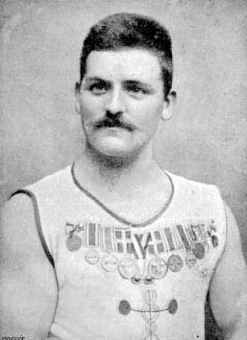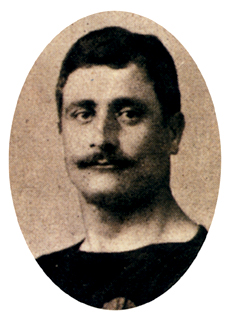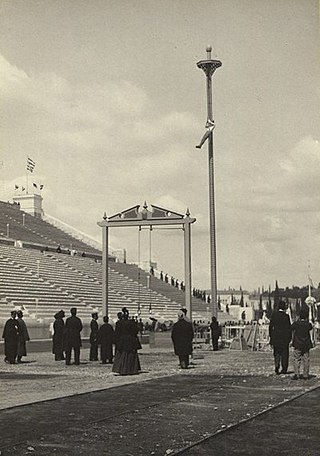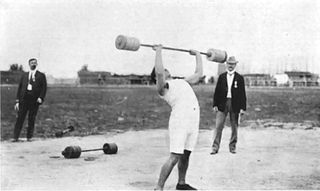
Weightlifting is a sport in which athletes compete in lifting a barbell loaded with weight plates from the ground to overhead, with the aim of successfully lifting the heaviest weights. Athletes compete in two specific ways of lifting the barbell overhead. The snatch is a wide-grip lift, in which the weighted barbell is lifted overhead in one motion. The clean and jerk is a combination lift, in which the weight is first taken from the ground to the front of the shoulders, and then from the shoulders to over the head.

The 1896 Summer Olympics, officially known as the Games of the I Olympiad and commonly known as Athens 1896, was the first international Olympic Games held in modern history. Organised by the International Olympic Committee (IOC), which had been created by French aristocrat Pierre de Coubertin, it was held in Athens, Greece, from 6 to 15 April 1896.

At the 1896 Summer Olympics, two weightlifting events were contested. The top two places were won by the same two men in each event, though their order was reversed for the two events. The bronze medals were split by the two Greek weightlifters. A total of seven men from five nations competed.

Launceston Elliot was a Scottish weightlifter, and the first British Olympic champion.

Alexander Viggo Jensen was a Danish weightlifter, sport shooter, gymnast, and athlete. He was the first Danish and Nordic Olympic champion, at the 1896 Summer Olympics in Athens.

Carl August Berthold Schuhmann was a German athlete who won four Olympic titles in gymnastics and wrestling at the 1896 Summer Olympics in Athens, becoming the most successful athlete at the inaugural Olympics of the modern era. He also competed in weightlifting.
Georgios Saranti Papasideris was a Greek athlete and weightlifter.

Sotirios Versis was a Greek athlete and weightlifter. He competed at the 1896 Summer Olympics in Athens and the 1900 Summer Olympics held in Paris.

Three athletes from Denmark competed in five sports at the 1896 Summer Olympics in Athens. Two of the three combined to win a gold medal, two silvers, and three bronzes, while Eugen Schmidt earned no medals. Viggo Jensen contributed one of each color, while Holger Nielsen earned the second silver and two bronzes. Shooting and weightlifting were Denmark's most successful sports. Denmark had 15 entries in 12 events, winning six medals.

Germany competed at the 1896 Summer Olympics in Athens, Greece. The Germans were the third most successful nation in terms of both gold medals and total medals (13). Gymnastics was the sport in which Germany excelled. The German team had 19 athletes. The Germans had 75 entries in 26 events, taking 13 medals.

Ten athletes from the United Kingdom of Great Britain and Ireland competed in seven sports at the 1896 Summer Olympics. The Great Britain athletes were the fifth most successful in terms of overall medals (7) and tied for fifth in gold medals (2). The 7 medals came on 23 entries in 14 events.

Greece was the host nation of the 1896 Summer Olympics held in Athens. The number of Greek contestants is commonly cited as 169, but as many as 176 Greeks contested events in all nine sports. The Greeks were by far the most successful nation in terms of total medals with 47, 27 more than the United States of America. Nevertheless, their number of first-place finishes (10) was one fewer than the Americans' 11. The Greeks had 172 entries in 39 events. Only 4 events had no Greek entrants—the 400 metres and the high jump in athletics and the vault and the team horizontal bar in gymnastics.
Alexandros Nikolopoulos was a Greek weightlifter. He competed at the 1896 Summer Olympics in Athens. In the one-handed event now known as the snatch, Nikolopoulos finished third out of the four lifters. He lifted 57.0 kilograms with one hand, matching the silver medallist Viggo Jensen, but could only manage 40.0 kilograms with the other, the same as fourth-place finisher Sotirios Versis.

Stephanos Christopoulos was a Greek wrestler. He was a member of Gymnastiki Etaireia Patron, that merged in 1923 with Panachaikos Gymnastikos syllogos to become Panachaiki Gymnastiki Enosi.

Weightlifting has been contested at every Summer Olympic Games since the 1920 Summer Olympics, as well as twice before then. It debuted at the 1896 Summer Olympics, in Athens, Greece, and was also an event at the 1904 Games.

Denmark first participated at the Olympic Games at the inaugural 1896 Games, and has sent athletes to compete in every Summer Olympic Games since then, except for the sparsely attended 1904 Games. Denmark has also participated in the Winter Olympic Games several times since 1948, including every Games since 1988.

The men's rope climbing was one of eight gymnastics events on the Gymnastics at the 1896 Summer Olympics programme. The final event in the gymnastics competition, rope climbing was held on 10 April. The rope was 14 metres long, suspended from a frame. Time and style were considered in placing the competitors who reached the top and distance climbed separating those who did not make it all the way up. Five competitors entered, with the two Greeks taking top honors by being the only two to complete the climb. The German Fritz Hofmann won the bronze medal, while the weightlifting champions Viggo Jensen and Launceston Elliot finished fourth and fifth.

The men's one hand lift, an event similar to the modern snatch, was one of two weightlifting events in the weightlifting at the 1896 Summer Olympics programme.

The men's two hand lift was a weightlifting event held as part of the Weightlifting at the 1904 Summer Olympics programme. It was the second time the event was held. Four athletes from two nations competed.

















